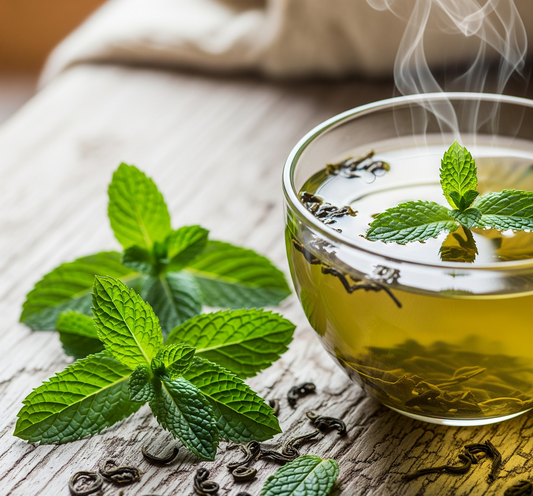Chamomile tea, with its light, floral flavor and natural sweetness, has been cherished for centuries for its soothing and therapeutic properties and is a good sleepytime tea. Whether you're seeking relaxation, better sleep, improved digestion, or even potential protection against certain health issues, a cup of chamomile tea could be your new go-to remedy. In this article, we'll delve into the myriad benefits of chamomile tea, exploring its effects on inflammation, cold symptoms, heart health, digestion, sleep, anxiety, immune support, and more.
1. Anti-Inflammatory Properties:
Chamomile tea's anti-inflammatory properties have been shown to alleviate symptoms of inflammation, making it a potential source of relief for conditions like arthritis.
2. Soothing for Cold Symptoms:
Studies suggest that chamomile tea can be effective in reducing the discomfort of common cold symptoms, providing relief when you're feeling under the weather.
3. Heart Health Support:
While ongoing research is exploring chamomile's potential heart-healthy benefits, current findings hint at its positive effects on conditions like coronary heart disease.
4. Digestive Aid:
After a hearty meal, a cup of chamomile tea can aid digestion and soothe stomach troubles. It has been linked to reduced acid reflux symptoms, reduced bloating, and overall gastrointestinal health.
You might like: Health Benefits of Chamomile Ginger Tea
5. Enhancing Sleep Quality:
If you struggle with sleep, chamomile tea's mild sedative effect can help you fall asleep. Additionally, it can contribute to improved sleep quality and address sleep issues linked to mental health concerns.
6. Stress and Anxiety Relief:
Chamomile's relaxation-inducing properties make it an excellent choice for stress and anxiety relief. Its mild sedative effect can help you calm down physically and mentally.
7. Soothing Sore Throats:
Research shows that chamomile tea can provide relief for sore throats and hoarseness. Adding a bit of honey can enhance its soothing and antimicrobial effects.
8. Immune System Support:
Preliminary research suggests that chamomile may contain antibacterial properties that contribute to immune system support, potentially helping ward off illnesses.
9. Menstrual symptoms
Researchers Trusted Source found that the anti-inflammatory, antispasmodic, sedative, and anti-anxiety properties of chamomile could potentially provide relief from the anxiety and discomfort associated with premenstrual syndrome (PMS).
Brewing the Perfect Cup:
For a delightful cup of chamomile tea, steep about one heaping teaspoon of tea leaves in six ounces of boiling water for approximately five minutes. You can enjoy it as is or add a spoonful of honey for a touch of sweetness.

Frequently Asked Questions (FAQs) for Chamomile Ginger:
-
Does Chamomile Tea Contain Caffeine?
No, chamomile tea is naturally caffeine-free, making it an ideal choice for those seeking a calming beverage before bed. -
Can Chamomile Tea Help with Sleep?
Yes, chamomile tea's mild sedative properties can aid in falling asleep and improving sleep quality. -
What Does Chamomile Tea Taste Like?
Chamomile tea offers a mild, floral, slightly sweet taste that can be enjoyed on its own or with honey. -
Is Chamomile Tea and Manzanilla Tea the Same?
Yes, chamomile and manzanilla are different names for the same plant, with manzanilla being the Spanish term for chamomile.
Incorporate the soothing benefits of chamomile tea into your daily routine for a comforting and natural way to promote relaxation, well-being, and overall health.
From aiding digestion to improving sleep quality, chamomile's diverse benefits make it a valuable addition to your herbal tea collection.





Chamomile Tea: A Natural Remedy for Health and Relaxation
Comment (1)
Love to try the Chamoile Tea.